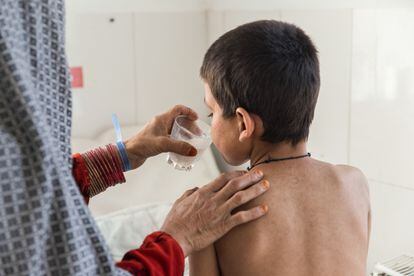Her name was Tahera (assumed name to preserve her identity).
Her parents brought her to the Rehat hospital, supported by Doctors Without Borders.
She arrived with a rash spreading across her small body.
After a medical check-up, she was transferred to the measles intensive care section, where we had about 50 patients in a space that is only able to accommodate 20.
Tahera felt worse every day and it was getting harder and harder for her to breathe.
In addition to having the measles, she was clearly malnourished.
Seeing that she was not improving, we took her to the critical patient area.
Just by holding her in her arms, you could already tell that the little girl was completely at the limit.
More information
Measles rages on children in Afghanistan
Too often, several times a day, children come to us who no longer have the strength or energy to fight.
Sometimes, it doesn't matter what we do;
we end up losing many patients, especially those children who have measles and who are already very weak.
In recent times, the average is two a day.
As we lay Tahera on the bed, we watched with anguish as she made enormous efforts to breathe, each using the muscles of her body to try to force air in and out of her lungs.
Her eyes were narrowing and her body began to give up.
We did everything we could not to lose her.
We gave her oxygen to help her breathe, but even so, her levels began to drop very quickly.
Under normal conditions, a healthy person has oxygen levels above 95%.
Tahera had them much lower and, no matter what we did, they didn't stop: 30%, 28%, 22%... Her skin began to turn purple.
We were all running around thinking about what we could do to save the little girl and feeling enormous helplessness because all the standard procedures were failing us.
And just when we were about to lose her, we had an idea.
When a newborn is not breathing well, it is recommended to put him on his stomach, which we call the prone position.
This is something that in Afghanistan we had done with adult patients affected by covid-19, but we had never tried something similar with children.
It was our last option, so the whole team of toilets met to try it.
We wrapped the little girl in a blanket and turned her over, laying her on her stomach with her face carefully turned to one side.
In response to the outbreak, we opened a 60-bed space just for measles patients;
three days after opening, we already had 112 patients
Babies don't usually like this position;
therefore, it was important to minimize their stress levels as much as possible.
Her mother was watching the whole process, very worried.
We asked him to go over to her daughter to talk to her, give her little hand and pet her.
For the next five minutes, we carefully watched the numbers on Tahera's oxygen monitor.
Little by little, they began to rise.
They went from 22% to 89, 91, 92%, and stabilized around 90%, almost normal numbers.
The relief on the face of his mother and the entire team was evident.
This time, we had exceeded expectations.
We turned around and told her mother that everything was going to be okay.
Measles is one of the most contagious diseases in the world, but it is also one of the easiest to prevent with a safe and effective vaccine.
But due to the crisis that Afghanistan's health system has been going through for years, long before the Taliban came to power, many children have not been able to get immunized.
Throughout this period of war, many have been left without receiving routine vaccinations, including measles.
Saed Bibi is giving her 10-year-old son Saddiqulah a glass of milk in the MSF-supported Boost hospital paediatrics.
The boy has measles, which has led him to develop pneumonia and severe sepsis. Oriane Zerah (MSF)
In this last year, cases have increased a lot throughout the country, not only in Herat, where more than 200 a week reach us, most of them under five years old.
Of these, 60% need to be admitted to receive additional care.
Promoting a vaccination campaign throughout the country could break the chain of transmission, but the sanctions imposed on the Taliban since they came to power in August 2021 have meant the interruption of aid to Afghanistan, including the importation of vaccines against the measles.
And it is for this reason that we are now in the midst of an outbreak without having sufficient doses for the population.
Until all children are vaccinated, children like Tahera will continue to arrive at our hospital.
And I'm afraid we will continue to be very busy.
In response to the outbreak, we opened a 60-bed space just for patients with this ailment.
And three days after opening, we already had 112 patients;
most of them sharing beds due to lack of space.
Our teams in Herat and Kabul, after much negotiation, managed to get us enough measles vaccines to immunize the entire city of Herat, where most of our patients come from.
And, although thanks to this campaign we will save many lives in Herat, we know that many other communities will not have the same luck.
Above all, in places where MSF is not present and where the situation is even worse than here.
Rebecca Ferguson
is a pediatric nurse with Médecins Sans Frontières (MSF) in Afghanistan.
You can follow PLANETA FUTURO on
,
and
, and subscribe
to our 'newsletter'
here
.



/cloudfront-eu-central-1.images.arcpublishing.com/prisa/KA3LQ5ZEAFEQXOIZXJEEVDUZUQ.jpg)




/cloudfront-eu-central-1.images.arcpublishing.com/prisa/KMEYMJKESBAZBE4MRBAM4TGHIQ.jpg)


